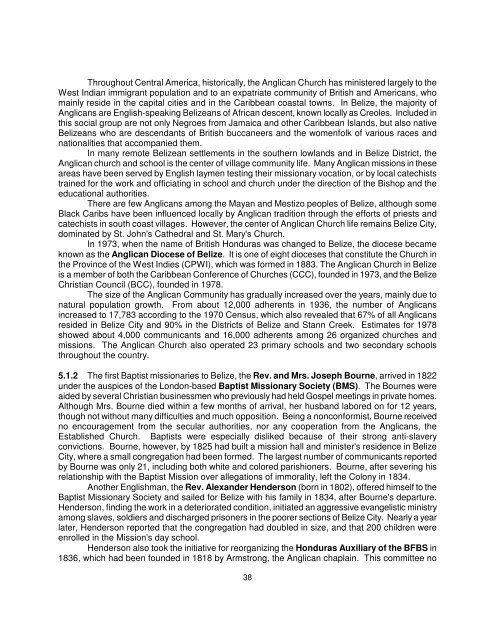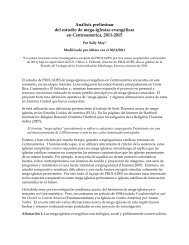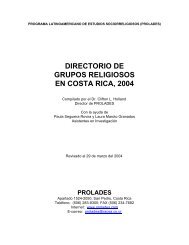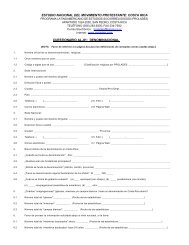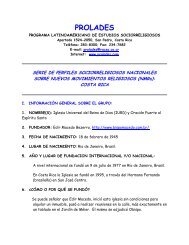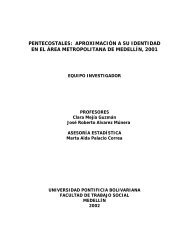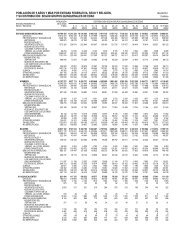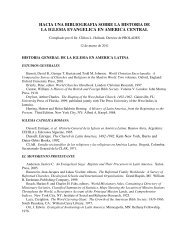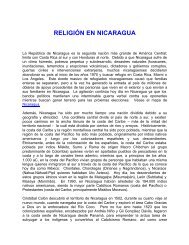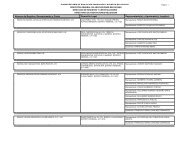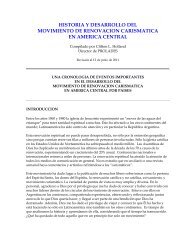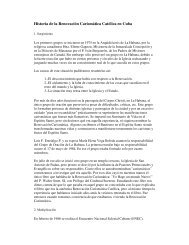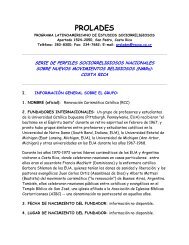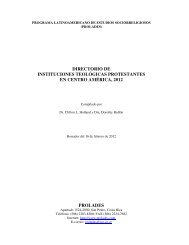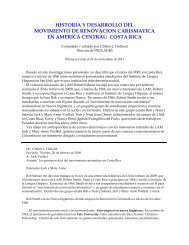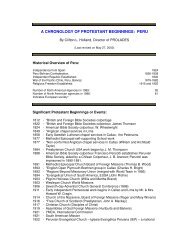belize, 1980 - Prolades.com
belize, 1980 - Prolades.com
belize, 1980 - Prolades.com
Create successful ePaper yourself
Turn your PDF publications into a flip-book with our unique Google optimized e-Paper software.
Throughout Central America, historically, the Anglican Church has ministered largely to the<br />
West Indian immigrant population and to an expatriate <strong>com</strong>munity of British and Americans, who<br />
mainly reside in the capital cities and in the Caribbean coastal towns. In Belize, the majority of<br />
Anglicans are English-speaking Belizeans of African descent, known locally as Creoles. Included in<br />
this social group are not only Negroes from Jamaica and other Caribbean Islands, but also native<br />
Belizeans who are descendants of British buccaneers and the womenfolk of various races and<br />
nationalities that ac<strong>com</strong>panied them.<br />
In many remote Belizean settlements in the southern lowlands and in Belize District, the<br />
Anglican church and school is the center of village <strong>com</strong>munity life. Many Anglican missions in these<br />
areas have been served by English laymen testing their missionary vocation, or by local catechists<br />
trained for the work and officiating in school and church under the direction of the Bishop and the<br />
educational authorities.<br />
There are few Anglicans among the Mayan and Mestizo peoples of Belize, although some<br />
Black Caribs have been influenced locally by Anglican tradition through the efforts of priests and<br />
catechists in south coast villages. However, the center of Anglican Church life remains Belize City,<br />
dominated by St. John's Cathedral and St. Mary's Church.<br />
In 1973, when the name of British Honduras was changed to Belize, the diocese became<br />
known as the Anglican Diocese of Belize. It is one of eight dioceses that constitute the Church in<br />
the Province of the West Indies (CPWI), which was formed in 1883. The Anglican Church in Belize<br />
is a member of both the Caribbean Conference of Churches (CCC), founded in 1973, and the Belize<br />
Christian Council (BCC), founded in 1978.<br />
The size of the Anglican Community has gradually increased over the years, mainly due to<br />
natural population growth. From about 12,000 adherents in 1936, the number of Anglicans<br />
increased to 17,783 according to the 1970 Census, which also revealed that 67% of all Anglicans<br />
resided in Belize City and 90% in the Districts of Belize and Stann Creek. Estimates for 1978<br />
showed about 4,000 <strong>com</strong>municants and 16,000 adherents among 26 organized churches and<br />
missions. The Anglican Church also operated 23 primary schools and two secondary schools<br />
throughout the country.<br />
5.1.2 The first Baptist missionaries to Belize, the Rev. and Mrs. Joseph Bourne, arrived in 1822<br />
under the auspices of the London-based Baptist Missionary Society (BMS). The Bournes were<br />
aided by several Christian businessmen who previously had held Gospel meetings in private homes.<br />
Although Mrs. Bourne died within a few months of arrival, her husband labored on for 12 years,<br />
though not without many difficulties and much opposition. Being a nonconformist, Bourne received<br />
no encouragement from the secular authorities, nor any cooperation from the Anglicans, the<br />
Established Church. Baptists were especially disliked because of their strong anti-slavery<br />
convictions. Bourne, however, by 1825 had built a mission hall and minister's residence in Belize<br />
City, where a small congregation had been formed. The largest number of <strong>com</strong>municants reported<br />
by Bourne was only 21, including both white and colored parishioners. Bourne, after severing his<br />
relationship with the Baptist Mission over allegations of immorality, left the Colony in 1834.<br />
Another Englishman, the Rev. Alexander Henderson (born in 1802), offered himself to the<br />
Baptist Missionary Society and sailed for Belize with his family in 1834, after Bourne's departure.<br />
Henderson, finding the work in a deteriorated condition, initiated an aggressive evangelistic ministry<br />
among slaves, soldiers and discharged prisoners in the poorer sections of Belize City. Nearly a year<br />
later, Henderson reported that the congregation had doubled in size, and that 200 children were<br />
enrolled in the Mission's day school.<br />
Henderson also took the initiative for reorganizing the Honduras Auxiliary of the BFBS in<br />
1836, which had been founded in 1818 by Armstrong, the Anglican chaplain. This <strong>com</strong>mittee no<br />
38


